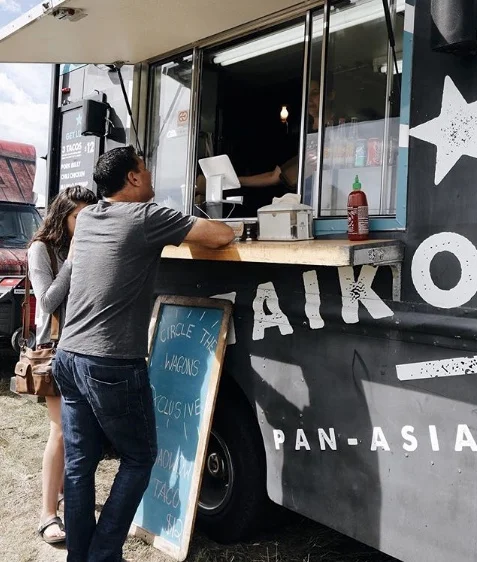It may come as a surprise, but food trucks are inherently less wasteful than traditional restaurants in many ways. Once they arrive at their destination, they use only a fraction of the utilities that larger brick and mortar restaurants use. Food trucks must also contend with unique challenges, such as limited space for food and supplies (including water) forcing them to conserve as much as they can and making them highly aware of waste. When it comes to overall emissions, there doesn’t appear to be a definitive answer as to which setup comes out ahead.
LEAF releases annual Guide to Canada's Greenest Restaurants
LEAF has released our annual Guide to Canada’s Greenest Restaurants for 2018. For the past number of years, sustainable dining and various aspects of it , including local food, sustainable seafood, meatless menus, and environmental practices, have been listed as some of the top trends in restaurants and food service. Increasingly, restaurants are realizing that operating as a more sustainable business is also good for their bottom line.
Restaurants waste an average of 50 tons of food each year, and use 2.5 to 5 times more energy per square foot than other commercial buildings. 96 per cent of LEAF restaurants compost their food waste versus just 9 per cent of conventional restaurants. 85 per cent of LEAF restaurants use energy efficient or ENERGY STAR appliances versus just 52 per cent of conventional restaurants. LEAF restaurants consistently outperform conventional restaurants.
Consumers are increasingly more aware of the impact of their purchasing decisions, and gravitate towards more environmentally sound purchasing choices when presented with options. Dining at a LEAF certified restaurant takes the guesswork out of the equation for consumers. The restaurants on this list have all been audited by an independent third party, and demonstrate a commitment to operating in an environmentally sustainable manner. Canadian diners can find an updated list of LEAF certified restaurants in their area, year round, on the LEAF website.
We are continually raising the bar for what it means to be LEAF certified. In the coming weeks, LEAF’s version 4.0 criteria will be released, which places a greater emphasis on single use disposable plastics and food waste.
Support a more sustainable foodservice industry - visit a LEAF certified restaurant in your area today!
Don’t see one on the list in your area? Send them this link and suggest they get certified!
Follow LEAF on Twitter @LEAF_Canada, on Instagram @LEAF_Canada, and on Facebook L.E.A.F
SAIT Celebrates Five Years of LEAF Certification
By Stephanie Ball
The School of Hospitality and Tourism at the Southern Albert Institute of Technology (SAIT) continues to push the sustainability envelope, more than five years after becoming LEAF certified.
Operations Manager Brad Rosenberger has been with the School of Hospitality and Tourism for 11 years and has witnessed and implemented many changes since joining SAIT.
Long before the City of Calgary rolled out its green bin program, SAIT was diverting organic waste in a big way. Large compost bins are provided all around the main campus, and they are getting a lot of use – especially in the culinary programs.
"We go through a lot when it comes to food,” says Rosenberger. “The green bins ensure we're doing our part for the environment and for SAIT itself.”
As an added bonus, both the culinary garden and campus landscaping areas benefit from the composted material and SAIT’s used cooking oil is reprocessed and used to produce biodiesel.
The school deals with many different suppliers and does their best to select sustainable food products.
“It’s about limiting our impact on the environment. It’s about being responsible,” says Rosenberger when asked what it means to be a sustainability leader.
SAIT has to set the standards and meet the needs of what the industry is demanding, he says. It's an important because students are going out into the world after they graduate to become executive chefs or hotel managers. They are the future of sustainability and so SAIT's environmental practices play a key role in teaching students to adapt and think ahead.
Rosenberger and SAIT’s School of Hospitality and Tourism are optimistic about the future and advancement of Alberta’s sustainability movement.
“Good things are happening.”
Radical Gardens leads as first LEAF certified restaurant in Timmins, Ontario
Timmins, Ontario gained its first LEAF Certified restaurant in 2015. Radical Gardens completed an audit and was able to achieve Level 2 LEAF Certification. We talked to owner, Brianna Humphreys about the process, her philosophy and their accomplishments.
LEAF: Do you have a food or sustainability philosophy? What is it?
RG: Yes, food sustainability is a mainstay of life for us. We started as a sustainable farm and still continue to farm. I guess our philoshophy is that: We need to give back into the Earth as much as we take.
LEAF: Describe your journey to sustainability – where did you start, and where are you now?
RG: I started out as a pretty small time hobby gardener and then it got out of control and then I bought a restaurant. Since the environment is key to our survival as farmers we made sure to create out restaurant with that in mind.
LEAF: What are the benefits of LEAF certification for Radical Gardens?
RG: The benefits are really for our customers, this certification allows them to really feel comfortable knowing that we are very serious in our commitment to sustainability.
LEAF: What sustainability accomplishments have you made at your restaurants that you are most proud of?
RG: Our composting for one. Any food waste that we may have gets sent back to our farm. Also our disposables and the fact that 90% of it decomposes or is recyclable.
LEAF: Why do you think sustainability is important in the restaurant industry?
RG: It is really important for any Business; if you don't come to realize that the Earth allows you the ability to run your own business no matter what it is we will lose it. For the restaurant industry specifically, there can be a large amount of waste created from our line of work, it is best to make sure you leave this place unstained.
LEAF: What sustainability goals are you striving to reach in the future?
RG: Our next goal is to purchase a large industrial composter that makes fertilizer and energy.
LEAF: Did anything surprise you about becoming LEAF certified?
RG: Actually i was pleasantly suprised to see that the certification process is rather in depth and pretty rigorous. I'm glad this certification is held to such a high standard.
Visit Radical Gardens today:
www.facebook.com/radicalgardens/
163 5th Ave, Timmins, On
COOPSCO is largest group to attain LEAF Certification
Level 2 LEAF Certification COOPSCO recipients
Towards the end of 2016, 25 food service facilities operated by 17 cooperatives of the COOPSCO Network in Quebec were awarded LEAF Certification. The major-scale project was run by Bleu Innovation and took over a year to complete. It was supported financially by the MAPAQ (Ministère de l'Agriculture, des Pêcheries et de l' Alimentation du Québec) through the Québec Food Marketing Support Program, which aims to encourage increased purchases of Québec food in the institutional market.
The COOPSCO Network is owned by more than 400,000 members (mostly students) in 60 school-based cooperatives in high schools, colleges and universities. They are known for their social and environmental commitments in their communities, so aiming for LEAF certification was a perfect fit. However, achieving LEAF Certification for facilities of this size is no small feat. For facilities that need to produce hundreds or even thousands of meals each day, local food purchasing and major procedural changes can be difficult. Despite this, some of their locations (COOPSCO St-Hyacinthe) were able to achieve up to 50% local food purchasing! But LEAF Certification is about much more than just food.
Le Cafélix at the Universitaire de l’Outaouais uses programmable thermostats to reduce energy use, and was able to decrease food waste by over 10% last year by conducting food waste audits. The cafeteria in Lapocatiere has a heat recovery system that captures heat from the swimming pool, and COOP HEC Montréal has a large garden for produce and uses all energy efficient LED lighting. The St-Hyacinthe locations also have menus with 30-60% vegetarian and vegan items, and geothermal energy. The Cafétéria Principale in l’Université de Sherbrooke uses mainly Energy Star appliances.
Congratulations to the students and staff of COOPSCO on an incredible achievement and continuing to show leadership in your industry!
LEAF Certified COOPSCO Food Service Facilities
Region of Outaouais
-Cafétéria of the Campus Gabrielle-Roy of the college and university cooperative of the Outaouais
-Cafélix Coopsco of the college and university cooperative of the Outaouais
-Café student of the Cité Collégiale of the collegial and university cooperative of the Outaouais
-Cafétéria of the Polyvalente Mont-Bleu of the collegiate and university cooperative of the Outaouais
Montreal Area
-Café l’Escale of the Co-operative Library of the Cégep de Maisonneuve
-Café Le Capharnaüm of the Student Co-operative Association of Édouard-Montpetit College
-Caféria of the Valleyfield College Student Association
-Caféria Decelles of the Coop HEC Montréal
– The main HEC Montréal Cooperative
-Restaurant the Cercle de la Coop HEC Montréal
Region of Montérégie
-Cafétéria of Coopsco St-Hyacinthe
-Café Bistro of Coopsco St-Hyacinthe
Region of Mauricie
-Cafétéria of the Shawinigan College of Coopsco Trois-Rivières
Central-Québec Region
-Cafétéria of the cooperative association F.-X. Garneau -Cafresia of Coopsco Ste-Foy
-Cafétéria du Cégep, Coopsco Victoriaville
Region of Saguenay Lac-St-Jean
-Cafétéria of the student association of Chicoutimi -Cafétéria of Coopsco college of Alma
Lower St. Lawrence Region
-Cut-the-Mouth of the Institut de Technologie Agroalimentaire, Coopsco La Pocatière
-Cafétéria of the Cégep De La Pocatière, Coopsco La Pocatière
-Cafétéria of the Coopérative du Cégep of Rivière-du-Loup
-Cafétéria of the student co-operative association of the Rimouski College
Eastern Townships Region
-Caféria of the Co-operative of the University of Sherbrooke -Cafétéria of the Solidarity Cooperative of the Cégep de Sherbrooke -Bistro of the Solidarity Cooperative of the Cégep de Sherbrooke
About Bleu Innovation
Bleu Innovation is mandated to implement the LEAF certification in Québec by accompanying and certifying food establishments (restaurants, cafés, cafeterias …) in an eco-responsible approach that targets all operations of establishments. www.bleuinnovation.com
Level 1 LEAF Certification COOPSCO recipients










